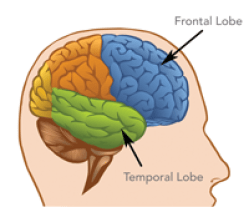Frontotemporal Dementia
Frontotemporal dementia (FTD) is not a single disease but a cluster of conditions resulting from the progressive degeneration of the frontal and temporal lobes of the brain in the individual affected by. FTD affects personality significantly, usually resulting in a decline in social skills, coupled with emotional apathy.
 At the brain level, by contrast with Alzheimer’s disease, FTD does not show any deposits of the amyloid beta protein but it is mainly characterized by the progressive accumulation of the toxic tau protein as neurofibrillary tangles in these brain regions. The build-up of tau tangles causes neuron cells to die, leading to dramatic shrinkage and cell loss in the frontal and temporal areas of the brain that are responsible for social skills, emotions and personality.
At the brain level, by contrast with Alzheimer’s disease, FTD does not show any deposits of the amyloid beta protein but it is mainly characterized by the progressive accumulation of the toxic tau protein as neurofibrillary tangles in these brain regions. The build-up of tau tangles causes neuron cells to die, leading to dramatic shrinkage and cell loss in the frontal and temporal areas of the brain that are responsible for social skills, emotions and personality.
The emotional deficits are extremely problematic and include lack of concern for a loved one’s illness, cruelty to children, animals and the elderly, lack of concern when others are sad, rude comments, loss of respect for intrapersonal space, socially inappropriate behaviors, and diminished response to pain.
Repetition, indifference to boredom, perseveration and focus on unimportant issues are some of the behaviors of patients with FTD. Unlike other types of dementia, FTD typically results in behavior and personality changes manifesting before memory loss and speech problems. It is more common than Alzheimer’s disease in people younger than 60 years old.
